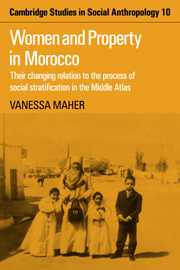 Women and Property in Morocco
Women and Property in Morocco Published online by Cambridge University Press: 27 October 2009
In this chapter I shall cover the relationship between capital accumulation in different social groups, and the significance of marriage and the frequency of divorce in those groups. Upon these, the nature of inheritance, i.e. whether it is in marketable property or in nonsaleable land, seems to have a bearing.
Divorce rates and property accumulation
An important question to consider in the attempt to explain different divorce rates is whether the statuses held by a woman in her family of origin and her husband's family are compatible or not, and which of these offers superior rewards. We are reminded of I. M. Lewis's emphasis on unequal agnatic loyalties as a precondition for stable marriage: ‘Where the wife relinquishes her premarital legal status and is incorporated in her husband's group, men and women here being subject to dissimilar agnatic loyalties, marriage is stable.’ If the statuses are not compatible, divorce is more likely. This is the case where a woman inherits property in land which she does not claim, or where her husband is too poor to pay bridewealth and thus acquire rights over her, which exclude those of her family. When divorce is more likely neither husband nor wife see their union as a definitive commitment but maintain an economic bond with, and emotional allegiance to, their kin.
To save this book to your Kindle, first ensure no-reply@cambridge.org is added to your Approved Personal Document E-mail List under your Personal Document Settings on the Manage Your Content and Devices page of your Amazon account. Then enter the ‘name’ part of your Kindle email address below. Find out more about saving to your Kindle.
Note you can select to save to either the @free.kindle.com or @kindle.com variations. ‘@free.kindle.com’ emails are free but can only be saved to your device when it is connected to wi-fi. ‘@kindle.com’ emails can be delivered even when you are not connected to wi-fi, but note that service fees apply.
Find out more about the Kindle Personal Document Service.
To save content items to your account, please confirm that you agree to abide by our usage policies. If this is the first time you use this feature, you will be asked to authorise Cambridge Core to connect with your account. Find out more about saving content to Dropbox.
To save content items to your account, please confirm that you agree to abide by our usage policies. If this is the first time you use this feature, you will be asked to authorise Cambridge Core to connect with your account. Find out more about saving content to Google Drive.